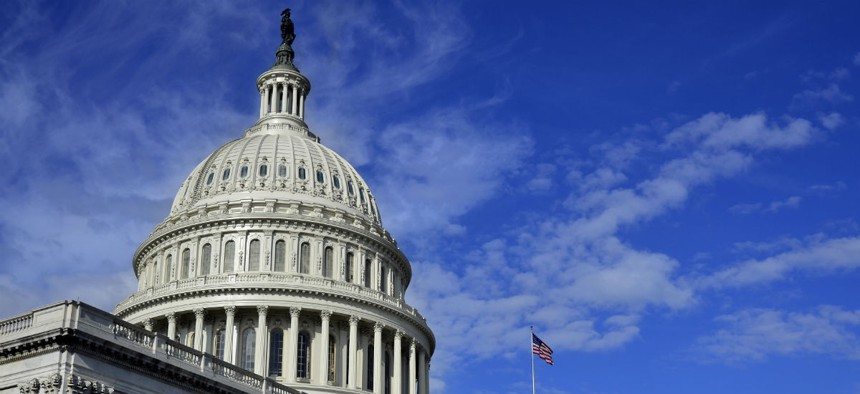
By Lane V. Erickson / Shutterstock.com
Congress Set to Pass Two-Week Stopgap Measure This Week to Avoid Partial Shutdown
Trump said he would likely approve a continuing resolution in light of George H.W. Bush's death.
Federal agencies appear likely to receive stopgap funding at the end of the week, with lawmakers and the White House signaling they need more time to avoid a partial government shutdown.
Negotiations over full year funding for fiscal 2019 were stalled by the death of President George H.W. Bush, whose casket will be held at the Capitol from Monday evening until his funeral on Wednesday. Lawmakers agreed to a two-week continuing resolution to expire Dec. 21, according to multiple aides, with the House set to approve the measure this week by unanimous consent. Trump, who had taken a hard line over the spending to demand it include $5 billion for his proposed wall along the U.S.-Mexico border, said over the weekend he would likely sign a stopgap bill.
“If [lawmakers] come—which they have—to talk about an extension because of President Bush’s passing, I would absolutely consider it and probably give it,” Trump said while traveling on Air Force One.
Congressional negotiators were still in talks over the details of the CR Monday morning, but agreed to a two-week measure by the afternoon. Passing the bill by unanimous consent will allow lawmakers to take the week off, aides said. A House Democratic staffer said that side preferred a one-week bill, but relented to Republicans who pushed for the longer measure. The Senate schedule was not immediately clear, but it is expected to quickly follow the House.
Congress and the president would have until Dec. 21 to approve a fiscal 2019 spending package that includes appropriations for the Transportation, Housing and Urban Development, State, Interior, Agriculture, Treasury, Commerce, Homeland Security and Justice departments, among other agencies, or around 300,000 federal workers will face furloughs in a partial government shutdown. A House Republican appropriations aide said negotiations are ongoing for the remaining spending bills, which will be considered together under one package.
Congress faced an easier road to passing spending bills after Trump earlier this year signed a two-year budget deal dramatically increasing spending caps for fiscal years 2018 and 2019. The funding measures already signed into law for fiscal 2019—which set full-year spending levels for departments of Defense, Labor, Health and Human Services, Education, Energy and Veterans Affairs—account for 75 percent of annual discretionary spending, the highest percentage allocated on time in 22 years. Funding for fencing and border security will continue to be a key sticking point once Congress resumes negotiations over appropriations for the rest of government.
Lawmakers have not yet raised spending caps instituted under the 2011 Budget Control Act for fiscal 2020, setting up another potential fight for the divided 116th Congress.
This story was updated with additional details on Congress' plans for passing spending bills.







